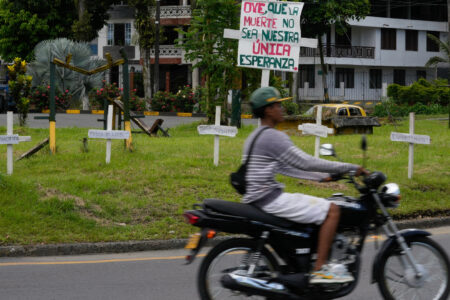
Soon after Minister for International Development Karina Gould announced the first phase of Canada’s global support to combat the COVID-19 pandemic, she also said that she expects further Canadian aid to be needed – and forthcoming – over the course of the pandemic. These commitments are a good first step, but if Canada wants to emerge as a world leader, it should consider aid that resonates with this country’s values. These include progressive stances towards women and human rights; a long-term vision, with flexibility and investment; and a commitment to debt relief working with diverse stakeholders.
When that time comes for the government to begin its international discussions, here are eight suggestions for the Government of Canada:
Be a global feminist leader
Whether in Canada or Bangladesh, women are at the core of those affected by the current crisis. Economic and social conditions often make it challenging or impossible for women to engage in social distancing and their significant share of caregiving – both at home and within healthcare systems – puts them at the frontline of the pandemic response. Guided by the Feminist International Assistance Policy, Canada should continue to champion an international feminist response to COVID-19.
This means tackling the concerns women have such as access to clean water, soap and food, addressing increased gender-based violence, ensuring girls continue to have access to education and challenging systems of power and exclusion that undermine women’s rights. It also means that Canada should listen to and work directly with women’s rights organizations that are active on the ground. Finally, Canada’s engagement in the global response should be characterized by feminist advocacy and leadership. Canada has a role to play in encouraging other countries and global actors to take an inclusive and gender-transformative approach to the COVID-19 response.
Stand up for human rights
Too often, crises are exploited by governments to consolidate power and undermine human rights and civil liberties. The current pandemic is no exception. Canada’s global leadership requires a strong stance here at home against actions that undermine rights and freedoms.
Abroad, this leadership means speaking out to promote and protect human rights and support an environment for civil society, trade unions, women’s rights organizations and citizens. Restrictions on public movement, association and assembly may be legitimate public health measures. Yet there are also fundamental rights.
Governments are limited by international law in their ability to infringe on human rights. Canada should be unequivocal in speaking out against abuses. Crises test our values. Canada and Canadians should stand firm on human rights.
Balance immediate response with long-term commitment
There is no question that immediate investments are needed in health systems, water, sanitation and hygiene to address and prevent the spread of the virus. At the same time, the Government of Canada has committed to maintaining existing development priorities amidst the COVID-19 response. Many of the world’s poorest countries were already facing sustainable development crises before the pandemic.
In Africa, climate-related disasters like locusts and drought were being aggravated by foreign exchange losses. Aid and other financial flows were already insufficient to meet the goals of the United Nations 2030 Agenda and the Sustainable Development Goals – and moving in the wrong direction. In a recent report, the UN noted backsliding on official development assistance, growing financial risks, high debt risk, increasing trade restrictions and rising environmental shocks. These pre-existing needs are being aggravated by COVID-19, which may put up to 180-million more people into poverty.
Integrate humanitarian response with development programming
There is growing recognition and commitment among countries and non-governmental organizations of the importance of working in the nexus between humanitarian, peace and development programming. This is especially true in the context of fragile and conflict-affected regions where peace processes, short-term basic human needs and long-term development processes collide. The affects of COVID-19 will require a cohesive response that considers these situations. The Government of Canada should allow partner organizations flexibility in using development and humanitarian funds to address urgent and emerging community and individual needs. This will improve organizations’ abilities to reach the most vulnerable without having to do project-by-project adjustments.
Up the ambition and acknowledge that existing aid resources will not be enough
Canada’s initial $159.5 million contribution came from existing, previously unallocated pools in its international assistance envelope. As the world grapples with multiple crises emerging from and predating COVID-19, existing resources will simply not be enough. African ministers of finance suggest that an additional $100 billion is needed globally to weather the health crisis and its related economic affects. An increased Canadian investment in the face of COVID-19 will contribute to a safer and healthier world – and in our connected global health system that means a safer and healthier Canada.
Be a debt relief champion
The effect of COVID-19 on countries across the global south has renewed calls for debt relief. More than 60 countries spend more on debt servicing than on public health. In the context of COVID-19, civil society organizations and activists, academics and governments and think tanks called for the immediate cancelation of debt payments for the poorest countries this year.
The G20 subsequently agreed to debt relief for many poor countries. While this does not amount to debt cancelation it is expected to free up US$20 billion for developing countries.
Canada has a strong track record on debt relief. As Canada supports the world’s poorest countries, the funds should be provided as grants rather than loans to minimize future debt burdens. Canada should also support additional multilateral debt relief initiatives. This would include joining European counterparts in calling for the allocation or transfer of additional IMF special drawing rights, which are supplementary foreign exchange reserve assets, to low-income countries. It also support the denial of legal standing to cases suing Southern countries for debt repayment. Finally Canada must support the World Bank’s call on commercial lenders to participate in debt relief alongside bilateral donors.
Partner with diverse stakeholders
Canada’s initial investments in global COVID-19 response was largely channeled through multilateral institutions. Support for the multilateral system will continue to be important going forward. While the COVID-19 response also requires private sector participation, it also demands a strong role for the public sector. Building capacity so developing countries can raise and spend their own funds to provide for their people and strengthen their public sector and governance should be part of Canada’s contribution to the global south.
Finally, as recognized in Canadian policy, Canada’s civil society organizations offer many distinct and important advantages as partners for international assistance – including longstanding relationships in the developing world, innovation and flexibility and experience in rights-based approaches. Civil society organizations on the ground have a track record in not only identifying who is being left behind, but also reaching them. Canadian civil society should be a core part of Canada’s global response to COVID-19.
Support equitable, resilient and sustainable recovery
The United Nations secretary-general has urged the international community to consider how to “recover better” from this pandemic. That means thinking seriously about how weak global systems can aggravate a crisis – and how strong ones can enhance our individual and collective resilience.
In least developed countries, as one recent analysis observed, “public health distress is now shaping an economic misery.” Economic difficulties exist in northern countries too, of course. But food, water and climate insecurity make a population more vulnerable to restricted movement of goods and people in a pandemic, while a strong social safety net allows people to engage in the physical distancing necessary to flatten the curve.
In addition to building a new, better, stronger global health system, Canada’s medium-term COVID-19 response should support the economic, social and environmental systems that ensure resilience in the face of new and emerging crises.
Canada’s commitments to date are welcome. However, if Canada wants to step up as a global leader, they will not be enough. Canada has an opportunity to forge a path as an ambitious global actor by supporting our neighbours abroad as we do at home. Through an approach led by diverse partners and grounded in feminist and human rights principles that focuses on investments and policy actions to support long-term equitable recovery, Canada can position itself at the forefront of championing a more resilient world as we emerge from this crisis.
This article is part of the The Coronavirus Pandemic: Canada’s Response special feature.
Photo: Aerial view of the empty streets of Guatemala City during COVID-19 lockdown. Shutterstock / by salmon-negro







